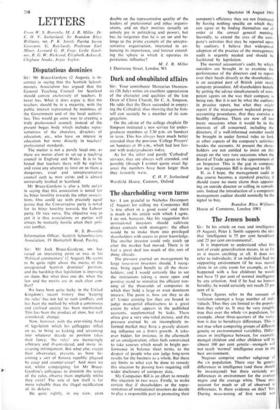The shareholding worm turns
Sir: I am grateful to Nicholas Davenport (2 August) for calling my Companies Bill 'a line effort in a good cause' and there is much in his article with which I agree. I do not, however, like his suggestion that institutional investors should cultivate direct contacts with managers: the effect would be to make them into privileged shareholders with access to prior knowledge. The smaller investor could only catch up after the market had moved. There is in fact a great deal too much of this sort of thing already.
The pressure exerted on management by large long-term investors should, I recog- nise. bring equal benefit to all the share- holders; and I would certainly like to see the institutions taking a more open and positive stand to stimulate the efficient run- ning of the thousands of companies in which they hold a large or even dominant interest. The point is, how are they to do it? Under existing law they are bound to judge managerial effectiveness to a great extent by what appears in the published accounts, supplemented by leaks. These often give a very one-sided picture, and the pressure exerted by an incompletely in- formed market may have a gravely distort- ing influence on a firm's growth. A take- over bidder, for instance, in the aftermath of an amalgamation. often feels constrained to take courses which result in bright per- formance in balance sheet terms, to the despair of people who can judge long-term results for the business as a whole. But there are limits to what can be done to remedy this situation by passing laws requiring still wider disclosure of company data.
My Companies Bill is an effort to remedy this situation in two ways. Firstly, to make certain that if shareholders or the repre- sentatives of institutional investors do decide to play a responsible part in promoting their
company's efficiency they are not frustrated by having nothing specific on which they can agree or by finding themselves out of order at the annual general meeting. Secondly, to extend the area of the com. pany's activities that may be reported upon by auditors. I believe that widespread adoption of the practice of the management audit is urgently needed and should be facilitated by legislation.
The normal accountant's audit, by which outsiders are brought in to examine the performance of the directors and to report over their heads directly to the shareholders, is an accepted part of British joint stock company procedure. All shareholders benefit by getting the advice simultaneously of com- petent agents on the way their company is being run. But it is not by what the auditors in practice report, but what they might report if the management neglected proper accounting procedures, that they exercise a healthy influence. There are now all too many occasions when it would be in the interests of all concerned, including the directors, if a well-informed outsider could be brought in under formal rules to look at other aspects of the company's activities besides the accounts. At present the share- holders are not entitled to insist on this except on the very rare occasions when the Board of Trade agrees to the appointment of an Inspector. This is the gap in company law my Companies Bill is designed to fill.
If, as I hope, the management audit in due course becomes a standard practice, it should cause no more alarm than appoint- ing an outside director or calling in consult- ants. Indeed the introduction of a competent management auditor should normally be the signal to buy.


































 Previous page
Previous page